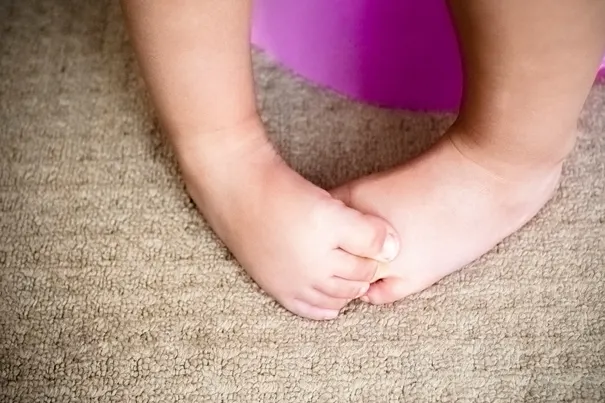Potty Training at Day Care
Did you know that your child's day care provider can and should be your trusted partner in helping your child learn to use the potty? The amount of time your provider spends with your child, plus her experience with other children, make her an ideal ally in this task — and a great resource for you and your family. Following are some ways to collaborate and build a successful "potty partnership" at day care.
Is My Child Ready?
Ask your care provider to help you watch for signals that your child is ready to begin potty training. Most children acquire the necessary skills between 18 and 30 months. Keep in mind that your child's developmental level, not his age, determines readiness. Click here for our checklist of readiness skills.
Be Consistent, and Communicate
A key factor in successful potty training is consistency. If your child follows the same routine and gets the same message at home AND at daycare, he will learn more quickly and easily. And your life will be a lot simpler, too.
Before your child begins training, talk to your day care provider and agree on an approach you both can follow. And keep an open dialogue going as issues come up along the way.
Talk the Talk
Following are some helpful topics to discuss with your provider:
Your goals and preferred methods of potty training
What equipment will be used, and how it will be kept clean
How to handle accidents. Accidents are not "failures" but are a normal and expected part of potty training. Communicating this to the child, and having a practical plan in place for dealing with cleanup, will help maintain your child's self-esteem and keep things on track.
What your child's temperament is like, and how that may affect his learning to use the potty
The role of peer pressure at day care
Your child's need for privacy
Besides keeping a dialogue going and following a common approach, here's what you and your child's day care provider can do to make potty training as stress-free as possible.
Parent's To-Do List
1. Dress your child in easy-to-remove clothing (no overalls or belts).
2. Make sure your child has at least one change of clothing at day care, in case of an accident.
3. Provide a healthful diet for your child that includes plenty of fiber. This will help ward off constipation, a common condition at this age that can quickly derail potty training.
4. Show your child what you expect for each step in using the toilet: discussing, undressing, going, wiping, dressing, flushing, and hand-washing.
5. Praise your child when he masters another skill/step.
6. Bring up any concerns to your provider.
Provider's To-Do List
1. Make sure the bathroom, changing area, and all potty training equipment are safe and cleaned frequently.
2. Maintain consistent records of the child's activities and developmental progress, and share it with the parent.
3. Offer fiber-rich meals and snacks.
4. Share potty training tips and information to parent on request.
5. Use books and games to model good toilet training habits.
6. Praise the child as he masters each step.
7. Be sensitive to the child's temperament, special needs, and cultural background.
8. Reassure the child (and his parents, if need be) when accidents and setbacks occur.
Tips for Parents and Providers
Keep the following general guidelines in mind as you work towards potty training success:
DO . . . Wait until a child is ready to begin training. Remember, there's no "right age" for potty training.
DO . . . Take potty training one step at a time.
DO . . . Expect and accept accidents as a normal part of the process.
DO . . . Praise a child whenever she attempts a new step and when she masters another skill.
DON'T . . . Rush or feel pressure to train your child. Potty training is not a competition. Allow your child to master each step at her own pace.
Read more about Toddler
Join a World of Support
through Pregnancy and Parenthood.
TRACK WITH TOOLS
LEARN WITH EXPERTS
GET REWARDED




